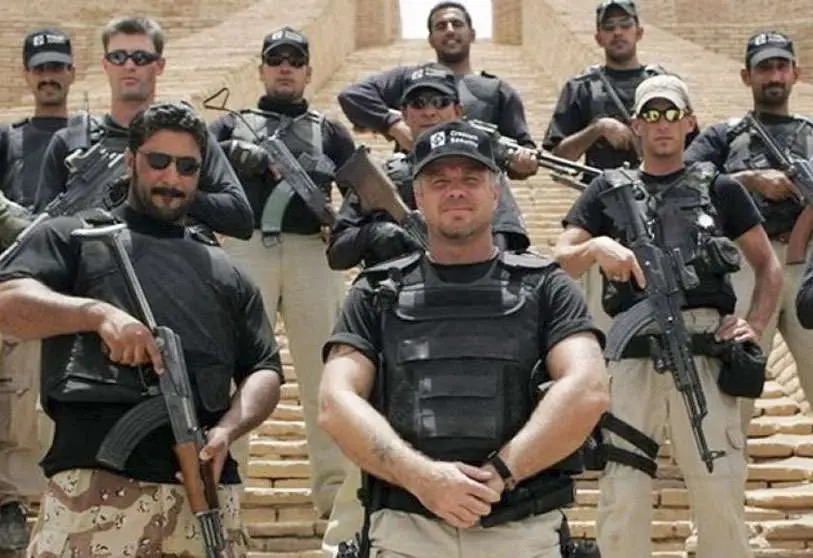Mercenaries

They are soldiers who, in return for payment, serve a foreign power in war. There has always been one because there has never been a shortage of adventurers and people who prefer easy money, even if it involves risk, to poorly paid daily work. When there is one. The Black Prince, an Englishman, came to the aid of Peter the Cruel or the Righteous, depending on your point of view, during the Spanish Civil War of the 14th century, while Henry of Trastámara was supported by the French mercenary Bertrand de Dugesclin, who declared that "I neither kidnap nor put a king, but I help my master" by handing over the brothers so that Henry could stab Peter.
This ancient profession was revived during the African wars in Congo (Katanga), Angola and Uganda in the last century. Frederick Forsyth's novel "The Dogs of War" directed by John Irving (Pink Floyd has made a record with the same title) tells the story of the invasion of a country by a group of brutal mercenaries with descriptions that make it easy to recognise the Bay of Malabo on the island of Bioko, which is the former Fernando Poo of Spanish colonisation. I don't know if this novel inspired the South African mercenaries led by Nick du Toit and Simon Man who, in 2004, tried to overthrow Teodoro Obiang in a botched coup attempt financed from afar by London-based Lebanese businessmen who had agreed to put a few naive and shameless natives in power in exchange for the conservation of the country's wealth in the form of timber and oil.
No kidding, they had it signed and put in writing. In this crazy adventure was a Tarambana, son of Margaret Thatcher, who was not supposed to be as "iron lady" inside their house as outside. A heavy blow was dealt when some of the South African mercenaries were already on Equatoguinean soil and were arrested and locked up in the sinister prison of Playa Negra. That was the end of this wild and senseless adventure. More recently, the United Arab Emirates, using chequebooks, hired Sudanese mercenaries to fight in their place in the dirty Yemen war. Then they thought better, and they has retired and left Saudi Arabia alone, which does not know how to get out of the mess that the ardent Crown Prince Mohamed bin Salman got it into.
The Americans have the Blackwater Group described by its founder as "a patriotic extension of the American armed forces", which is made up of former military personnel engaged in combat. It has been engaged in missions in Afghanistan and Iraq and, rumouredly, in Venezuela as well. When a scandal breaks out over human rights abuses, their contract is cancelled and, when a certain amount of time has elapsed, it is renewed.
Putin often uses mercenaries to throw stones and hide his hand. He used them to destabilise Eastern Ukraine and, dressed as "men in green" without any insipid or distinctive markings, they were the force occupying the Crimean peninsula that Moscow would later annex. They were also seen in Venezuela. The Wagner group has now travelled to Libya to support (without much success) Marshal Haftar's forces in their struggle to take control of Tripoli and become the country's dictator. The United Nations this month detected 338 Russian transport flights from Syria this month with personnel, supplies and equipment to support these mercenaries whose numbers on the ground do not seem high but who are heavily reinforced by Syrian fighters in the service of Bashar al-Assad.
Its intervention in Libya has led Turkey to support the Muslim Brotherhood, which supports the UN-backed government in Tripoli. Their massive shipment of arms, including drones, in violation of the existing embargo, prevented Haftar from taking control of the city and forced him to withdraw to Sirte, cutting the country in two. Today, Turkey is strengthening its presence by sending Syrian mercenaries recruited from groups that oppose the dictator to Damascus. Thus, today in Libya, the Syrians are once again fighting against the Syrians, as they used to do in their own country. It seems that these mercenaries are charging $2,000 a month for risking their lives, with an advance of $500 for the families they leave at home, and with the promise of several thousand in case of death. With the desperate situation in this country, it is not surprising that there are many volunteers.
What is curious is that Russia and Turkey are also sending mercenaries to fight on opposite sides in the war that has just broken out between Armenia and Azerbaijan over the Nagorno-Karabakh enclave, an old dispute that had been frozen since 1994. Russia supports Armenia and Turkey in Azerbaijan. There, the Russians seem to be using the Syrian Kurds, while the Turks have taken the Syrians from the province of Idlib, which they control. According to the Armenians, around twenty Syrians died in the latest fighting and they add that the Turkish involvement is more serious than is said because a Turkish F-16 is said to have shot down an Armenian plane. Ankara denies it.
The use of mercenaries is increasing and this is worrying for at least three reasons: because it increases the risk of conflict by allowing countries with resources to carry out interventions that they could not afford if the blood were their own; because it prolongs existing conflicts with fresh blood from the misery of war-torn countries or from demobilised and inactive soldiers; and because it risks producing a direct confrontation between countries that mistakenly do not want it.

